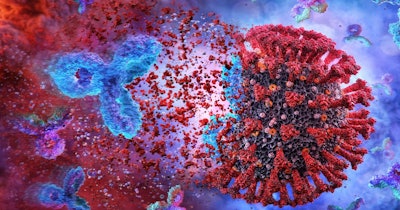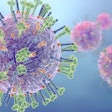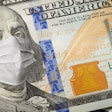
Immunoglobin G (IgG) and neutralizing antibody titer levels in a study were associated with protection against infection from the SARS-CoV-2 Omicron variant, and against symptomatic disease once infected.
The research, published Tuesday in JAMA Network Open, investigated vaccinated health care workers in Israel.
Previous studies reported an association between antibody titers and protection from SARS-CoV-2 infection at both the individual and population levels. A correlation between antibody levels and risk of infection was demonstrated for the wild-type, Alpha, and Delta variants. However, those studies were conducted before the emergence of the highly infectious Omicron variant, and participants had received two vaccine doses, before a third dose was recommended.
The Omicron variant emerged in Israel in late 2021, along with the waning of the immune response following the third vaccine dose. The dramatic increase in breakthrough infections among vaccinated individuals led Israel’s decision-makers to recommend a fourth Pfizer/BioNTech vaccine dose for healthcare workers and other high-risk populations, including elderly and immune-challenged people. This vaccination campaign was associated with reduced mortality and hospitalizations. However, the efficacy against infection was not as marked as it was for previous doses, and the optimal timing of the fourth dose remained unknown.
The researchers investigated whether the high antibody levels in individuals who had received at least three doses of an mRNA vaccine were associated with protection against infection with Omicron and reduced risk of Omicron infection and disease, at a time when this was Israel’s most predominant infection. Specifically, the team explored the association of an individual’s pre-infection titers of anti-spike IgG and neutralizing antibodies with three different outcomes: confirmed SARS-CoV-2 infection, symptomatic disease, and infectivity among those infected.
This prospective cohort study used serial real-time polymerase chain reaction (PCR) and serological test data from January and May 2022. Participants included 2,310 healthcare workers who had received three or four doses of an mRNA COVID-19 vaccine. Outcomes were measured using PCR and antigen testing and daily online surveys regarding symptomatic disease.
Participants were divided into three cohorts: all 2,310 were included in the protection from infection analysis (4,689 exposure events; median age 50); 667 participants were in the symptomatic disease analysis (median age 46; 516 female); and 532 participants were in the infectivity analysis (median age 48; 403 female). Lower odds of infection were observed for each 10-fold increase in pre-infection IgG, and for each two-fold increase in neutralizing antibody titers. The odds of substantial symptomatic disease were reduced for each 10-fold increase in IgG levels, and for each two-fold increase in neutralizing antibodies levels. Infectivity, assessed by mean cycle threshold value, was not significantly decreased.
“We found that a high humoral immune response, regardless of the number of booster doses or time since vaccination, was associated with reduced odds of Omicron infection and Omicron symptomatic disease,” the researchers concluded. “Thus, serological markers could be useful in assessing the risk of infection at both individual and population levels and in determining the necessity and timing of booster vaccination policies.”



















